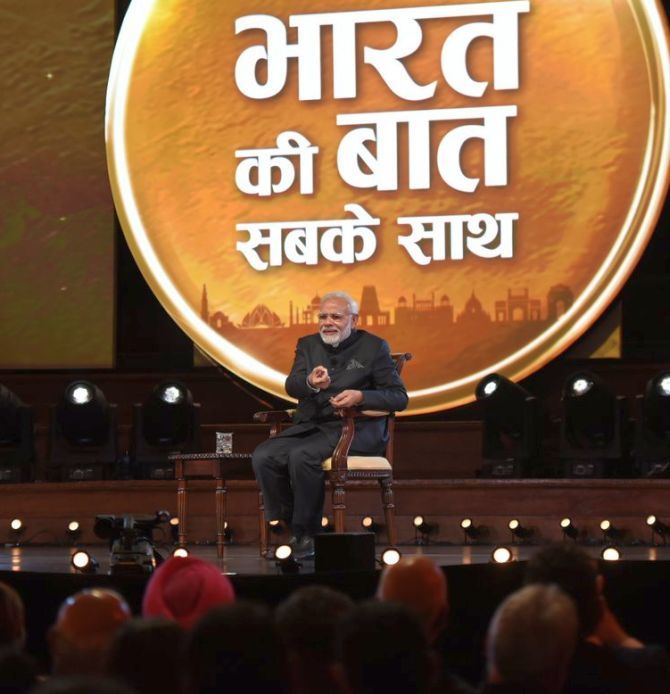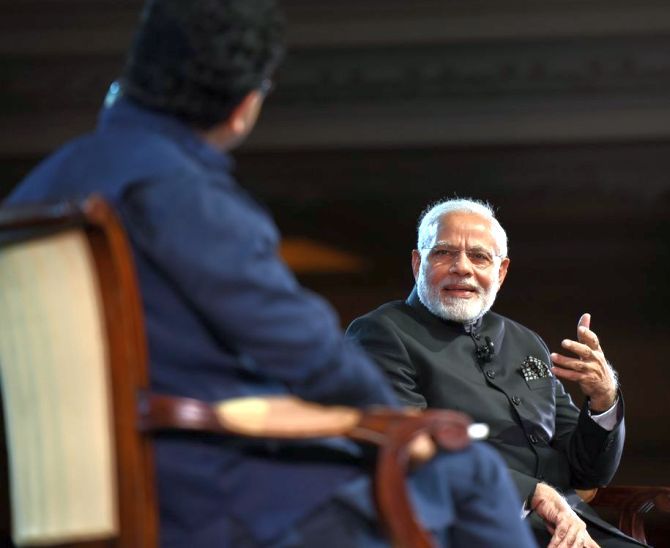Prime Minister Narendra Modi during the ‘Bharat Ki Baat, Sabke Saath’ programme in London also said that people have more expectations from his government because they know that it can deliver.

Prime Minister Narendra Modi on Wednesday said days of incremental change are over and Indians have become more aspirational under the Bharatiya Janata Party-led government at the Centre, taking a dig at the previous governments and their governance of making people dependent on the state.
Modi also said that people have more expectations from his government because they know that it can deliver.
“People know that when they say something, the Government will listen and do it. Days of incremental change are over,” Prime Minister Modi said while speaking at the ‘Bharat Ki Baat, Sabke Saath’ programme at the iconic Central Hall Westminster in London.
WATCH: Modi arrives at Central Hall Westminister for the event with the Indian Diaspora
Responding to a series of questions moderated by Prasoon Joshi, the Chairman of the Central Board of Film Certification, Prime Minister Modi said he was not born with an aim to be in history books.
Slamming his detractors, Modi said his problem is not against criticism.
“To criticise, one has to research and find proper facts. Sadly, it does not happen now. What happens instead is allegations,” Modi said in his more than two-hour long interaction.
“I want this government to be criticised. Criticism makes democracy strong. Democracy cannot succeed without constructive criticism,” he added.

Modi said earlier the government was centred around a family but people have shown that in democracy even a tea seller can become their representative and shake hands at the royal palace.
Noting that there is big difference between ‘then and now ‘, Modi said, “when the policy is clear, intention is clear, and the intentions are noble, then you can achieve the desired result.”
Responding to a question, Prime Minister Modi said impatience is not a bad thing. “If a person has a cycle, a person aspires a scooter. If a person has a scooter, a person aspires a car. It is natural to aspire. India is getting increasingly aspirational,” he said.
“Earlier, people had adopted a ‘chalta hai’ attitude but now they have high expectations from us,” Modi said, adding that the 125 crore people of India now feel excitement, hope and expectation.
“If you will see where we stand in comparison to previous government, I can affirm that we left no stone unturned in doing good for the country on any parameter,” he added.

“You all must have seen that the power of your passport has increased. People look at you with pride. India is still the same. But today we can see a difference. Indian has managed to do this and now people know the power of India,” Modi said, comparing his government’s achievements with that of his predecessors.
He asked what prevented Indian prime ministers from going to Israel, referring to previous governments’ policy of avoiding highest-level visit to the Jewish state.
“Yes, I will go to Israel and I will even go to Palestine,” said Modi, who is the first Indian prime minister to travel to both Israel and Palestine in two separate visits.
“I will further cooperation with Saudi Arabia and for the energy needs of India I will also engage with Iran,” Modi said, referring to the two Middle East oil-rich power centres who are at odds with each other.

He also warned Pakistan and said India will not tolerate those who export terror and will respond to them in the language they understand, referring to the 2016 surgical strikes conducted across the Line of Control.
“When someone has put a terror export factory in place and makes attempts to attack us from the back, Modi knows how to answer in the same language,” he said, amid applause.
“We believe in peace. But we will not tolerate those who like to export terror. We will give back strong answers and in the language they understand. Terrorism will never be accepted,” he asserted.

Invoking the father of nation, Modi said that during the freedom struggle Mahatma Gandhi did something very different and he turned the freedom struggle into a mass movement.
“He told every person that whatever you are doing will contribute to India’s freedom. Today, the need of the hour is to make development a mass movement,” the prime minister said, adding that he was determined to bring about a positive change in the lives of India’s poor.
On recent incidents of rapes of minor girls in the country, Modi expressed grief and called it an evil of not just the individual but also of the society.
Terming it as matter of concern, he said, “We always ask our daughters about what they are doing, where they are going. We must ask our sons too. The person who is committing these crimes is also someone’s son. He has a mother too in his house.”
When asked whether he can change the country alone, Modi said he was an ordinary citizen just like any other Indian.
“We have a million problems but we have a billion solutions,” he said.
“I can make mistakes but I will not do any work with ill intention,” Prime Minister Modi said.

Responding to a question on Modicare, he said his government was working for the health of every Indian.
“Our focus is on three things -- education for students, employment for youth and medicines for the elderly,” he said, adding that the ‘Ayushman Bharat’ health care scheme will cover more than 10 crore poor families providing them coverage of up to Rs 5 lakh per family annually.
Modi also lauded the 12th century Lingayat philosopher Basaveshwara and said he dedicated his life to the people and worked to unite them.
“Basweshwar did for women empowerment, democracy and social causes is an example for world,” Modi said.
Photographs: @PIBIndia/Twitter











 © 2025
© 2025